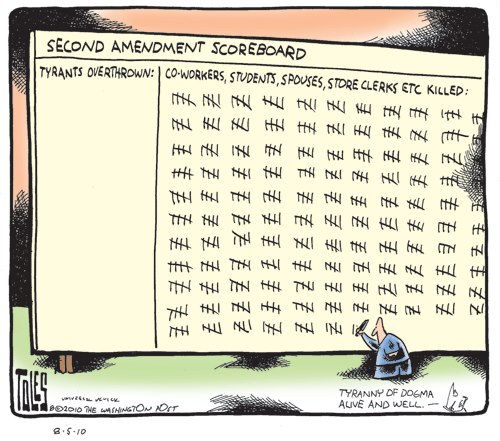I did my master’s thesis on political interest groups and one area I studied was gun rights groups in Canada and the US and their reaction to certain proposed legislation. Both the NRA in the US and the National Firearms Association here in Canada relied on the exact same argument, which was that government legislation on guns was a slippery slope in that once it began, it would lead to more and more laws and prohibitions until eventually every hunting rifle and shotgun was confiscated and outlawed. After the appalling 2017 Vegas mass shooting, in which 61 people were killed and over 800 were injured, even President Trump seemed ready to at least ban suppressors, which are used to muffle the sound of gunfire - an obvious plus if your goal is to kill people. But as always, the NRA immediately opposed this action, common sense and public safety be damned. To the gun lobby, the slippery slope argument was unassailable in its logic and its inevitability.
It’s not just guns. The fallacious reasoning of the slippery slope gets used in almost every political debate – free speech, abortion, taxes, etc. – and it’s used by all sides of the political spectrum. It’s been used during the pandemic by people who see totalitarianism lurking on every corner. “Vaccine passports? Before you know it, the government will decide who gets what health treatment and who lives or dies.” The tenor of the argument is always the same: if we allow/prohibit A, then the catastrophe/dystopia/end times of B will surely follow.
The slippery slope argument fails on many levels. Firstly, it's overly simplistic. Choices are always boiled down to two Manichean options in which compromise is not an option. You either let freedom reign and let anyone buy whatever gun they want, or you pass restrictions and are soon slaves to your government overlords in an Orwellian hellscape. There is no in-between. But compromise is the most redeeming feature of democratic societies because it forces us to consider other people’s views and thus find solutions that work for both sides of an issue. The slippery slope is actually an attempt to shut down debate, which makes compromise impossible. If doing A leads unquestionably to calamity, then there is no way to meet in the middle.
Secondly, it’s overly fatalistic. Why does A lead inevitably to B? In truth, things are never completely and definitively settled in open and democratic societies. Every new law has to be re-litigated in the court of public opinion. Democracies debate everything, so acting like something is a fait accompli is wholly misguided. Nothing is inevitable in a democracy because that’s the point of having one in the first place. We as a people can change our minds and make corrections. Democracies often completely switch course; if you don’t think so, you haven’t paid attention to the last 200 years of history. This fatalism betrays the lack of trust and belief some people have in our society and their fellow citizens. It says that we aren’t the authors of our own fate, that once something is set in motion, we are powerless to stop it until it reaches its dystopian conclusion. This is a patently ludicrous notion.
In truth, the slippery slope applies mainly to authoritarian and totalitarian regimes, who ratchet up their tyranny and violence in increments. To pick the most obvious and horrific example, the Nazis’ treatment of Jews went from Kristallnacht to segregation in ghettos to forced labour to mass extermination. Needless to say, this process was not up for public discussion. We heard a lot about authoritarian personalities when Trump won in 2016. People with authoritarian personalities don’t want to think too much; they want simplified, dichotomous choices between good and evil. To them, every argument boils down to selfish motivations, and compromise is a sign of weakness. The slippery slope argument is perfect for this type of person.
The psychology behind the slippery slope is always fear - of government, of the 'Other', of the world in general. The NRA relies on this fear and relentlessly drums it into its supporters. Soon you have a society where instead of having some semblance of reasonable gun laws, you get armed guards at every school and shopping mall and somehow this makes sense to people. You think the answer to gun murders is more guns, that what we really need is more armed people roaming the streets to stop the killers (by this idiotic logic, if every single person in the world had a gun, that would mean no one would ever get shot). This is how a fearful brain 'works.'
We saw how all this played out on January 6. The people who stormed the Capitol were, among other things, gun rights adherents who were gullible enough to believe a con man when he lied that the election was stolen. The irony of people who claim they need guns to prevent government tyranny violently attempting to stop a lawful election is utterly perfect in its absurdity, and it tells you everything you need to know about their attitude towards democracy. They have no faith in it, and they will only accept it when they get what they want.
To paraphrase Churchill, democracy isn’t perfect but it’s a lot better than any other system you can come up with. You have to accept that it's an often difficult process, and you have to believe in that process for it to work.


Kommentare